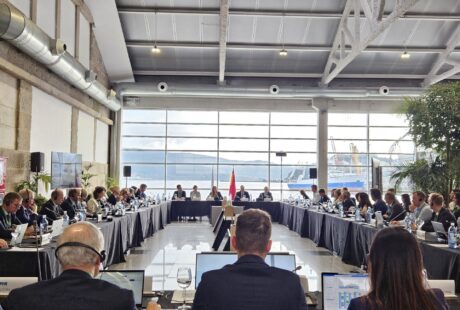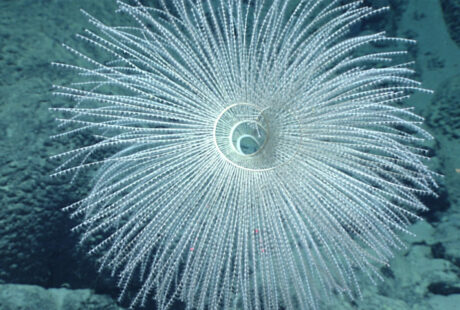The United Nations (UN) Ocean Conference will see the International Seabed Authority (ISA) – the body established by the UN to regulate deep-sea mining in international waters – widely advertise its contributions to several Sustainable Development Goals (SDGs). The reality is rather less glowing: the ISA aims to rush through deep-sea exploitation regulations within the year, opening the door to large-scale deep-sea mining, despite scientists warning that the scientific basis is inadequate. It also continues to ignore the tsunami of calls for a moratorium on deep-sea mining.
The ISA began its SDG PR campaign in late 2021, with the publication of a report that profiled the organisation as an SDG champion, contributing to 12 of the 17 SDGs. However, much of the conclusions rely on regulations and management mechanisms that are still in the making, as well as largely unsubstantiated comparisons with terrestrial mining. The analysis itself is based on a limited literature review and interviews with experts whose close links with ISA (e.g. country representatives to ISA, members of ISA’s Legal and Technical Commission (LTC), and industry representatives) raise questions about its objectivity.
A key shortcoming in the ISA’s SDG assessment is its failure to include any ‘no deep-sea mining’ option. It also omits scenarios in which demand for metals is drastically reduced through transformative economic and social change. This suggests that the ISA still views itself primarily in terms of deep-sea mining facilitation rather than deep-sea protection.
Several of the conclusions on progress towards the SDGs assume robust exploitation regulations that deliver fully on SDG 14 (Life below water) and strongly protect the marine environment. As yet, however, the ISA’s draft regulations, standards and guidelines for deep-sea mining are neither acceptable nor effective from an environmental point of view. Hundreds of scientists have issued an urgent warning that scientific knowledge remains too limited to establish reliable standards and thresholds or to allow the development of effective regulation.
Another UN body, the Environment Programme Finance Initiative, has issued a starkly contrasting assessment of deep-sea mining and its links to sustainability and SDG 14. Its Harmful Marine Extractives briefing concluded that ‘…there is no foreseeable way in which the financing of deep-sea mining activities can be viewed as consistent with the Sustainable Blue Economy Finance Principles, or compatible with the spirit and intent of the Sustainable Blue Economy.’ It also concluded that ‘at present, no robust, precautionary approach exists to safeguard the ocean against the potential ecological impacts of deep-sea mining.’
The claim that deep-sea mining will alleviate poverty (SDG 1 – No poverty) through an ISA-governed benefit-sharing mechanism is similarly premature. The proposed mechanism for benefit sharing is under negotiation, with mining companies – and their shareholders – currently standing to benefit most. The 167 ISA member countries would receive, on average, USD 97,800 per year in compensation, which is insignificant in the face of the long-term, large-scale irreversible loss of biodiversity associated with deep-sea mining, which can also impact economic activities like fisheries and tourism.
On SDG 5 (Gender equality), the ISA cites the promotion of women scientists in deep-sea research. However, the ISA has some distance to go to achieve fair representation of women throughout its governing bodies. At present, women account for between one-quarter and one-third of participants in the Council and Assembly, and only one-tenth in the LTC, the key ISA body that in practice defines possible mining licences.
The ISA report states that it contributes to SDG 12 (Responsible consumption and production), but provides little substantiation. In fact, by providing an additional supply source for metals, deep-sea mining could become a disincentive for reducing use/waste of metals, thereby working against SDG 12. Several important end-users of metals (e.g. BMW, Renault, Volvo, Samsung, Google, etc) have already called for a moratorium because they have sustainability concerns. SDG 12 would be much better served by applying the multitude of measures that are available to drastically reduce the demand for primary metals and thus make deep-sea mining (and a mining boom on land) obsolete.
The ISA report argues that poorly regulated terrestrial mining has higher impacts than deep-sea mining, and the latter would thus reduce pressures on land (SDG 15 – Life on land). However, the knowledge gaps about the scale of deep-sea mining’s social and environmental impacts prevent any accurate comparison. It is highly unlikely that deep-sea mining will replace terrestrial mining – itself experiencing a boom – but, rather, that it will simply exist in addition to terrestrial mining. With a new competitor on the market, some terrestrial mining companies may even lower their standards.
In setting regulations and procedures, the ISA claims to contribute to SDG 16 (Strong institutions). However, ISA governance is clearly not fit for purpose, continuing to be characterised by opaque processes, exclusion of observers to the LTC, and the absence of an independent scientific or environmental committee. There are also potential conflicts of interest, not least the fact that the ISA itself stands to gain financially from deep-sea mining. Its refusal to engage with the growing support for a moratorium on deep-sea mining equally impedes progress on SDG 16.
The ISA intends to showcase its SDG credentials at the UN Ocean Conference, with events across themes such as ‘empowering women’, ‘support of the sustainable development of the blue economy’, ‘protection of the marine environment of the Area for the benefit of humankind’ and ‘inclusive sustainable ocean governance’.
Clearly, overstating achievements and understating impacts undermine the credibility of the SDGs. The upcoming five-year review of the ISA presents an opportunity for a truly independent evaluation of the ISA and deep-sea mining in the context of the SDGs. The need for closer control of the ISA in respect of its SDG performance – for example, by the UN General Assembly – is also evident.
Posted on: 27 June 2022



